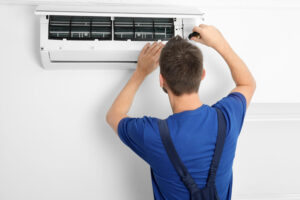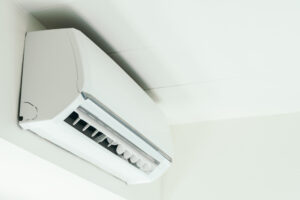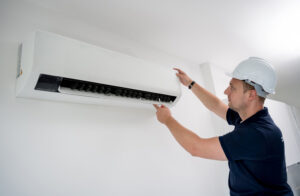When temperatures rise in Phoenix, air conditioning is more than a luxury—it becomes necessary. For many homes, a ductless AC unit provides a reliable way to stay cool without the need for bulky ductwork or extensive renovations. These systems are known for their flexibility, energy efficiency, and consistent performance, especially during long summer stretches.
But even the best systems can show signs of trouble. One of the easiest-to-spot signs that something is wrong is a strange odor. If your ductless AC unit in Phoenix has started emitting an odd smell when it powers on, it is not something to ignore. Strange odors are usually warning signs that point to issues that need prompt attention before they grow more serious.
Common Odors and Their Causes
Different odors from a ductless AC unit can mean different problems. Some issues may be minor, while others could point to health or safety risks. Knowing what each type of smell might mean can help you describe the problem clearly when speaking with our technicians.
Here are the most common odors homeowners in Phoenix might notice:
– Musty or moldy smell – This often means that moisture has built up inside the unit, providing a place for mold or mildew to grow. Mold can often take hold in the evaporator coils or behind the filters where condensation collects and does not dry properly.
– Rotten egg or sulfur-like odor – This can be a sign of a more serious concern, such as a natural gas leak near or around the unit. While ductless AC units do not use gas themselves, smells from nearby areas can get pulled in and pushed into your home’s air.
– Burning or electrical smell – If it smells like something is overheating or burning, it could be from worn-out wiring, a burnt motor, or a failing capacitor. This smell should never be ignored, and the unit should be turned off until it can be looked at.
– Dirty sock odor – When air passes over mold-covered coils or clogged filters, it can create a stale, damp scent, especially when the system starts after being off for a while. It may also mean that the system needs a deep cleaning or has drainage problems inside.
A homeowner in Phoenix recently mentioned that their living room started smelling musty each afternoon, but the scent disappeared overnight. Our technicians found that condensation was trapped inside the wall-mounted unit and was not draining properly—something hard to notice without opening the unit. Once cleared and cleaned, the odor was gone within a day.
Even if the smell is not strong or constant, it is often one of the first clues something is off. Pay attention to whether it comes from a specific unit, if it starts during operation, or lingers after the unit is off. The more detail you can give to our professionals, the faster the problem can be resolved.
Health And Comfort Implications
When a strange odor comes from your ductless AC unit in Phoenix, it can do more than just make your home smell unpleasant—it can also impact your health and daily comfort. Ignoring these smells might seem like an easy choice, especially if they come and go, but doing so can allow hidden issues to grow worse over time.
For example, lingering mold odors indicate trapped moisture, which sometimes leads to mold spores circulating through the air. That can affect household members who have allergies, asthma, or other respiratory sensitivities. Even if no one in the home has underlying issues, breathing in air passed over mold or mildew can feel stuffy and uncomfortable. In some cases, it can even cause throat irritation or headaches.
Depending on the source of the smell, you could also be dealing with mechanical issues that threaten indoor safety. A burning smell typically means internal components are overheating, which can increase the risk of system failure or, in rare cases, electrical hazards. Rotten or sour odors might mean something is decaying inside the unit or near the intake, which may cause poor air quality and attract pests.
All these problems affect your ability to enjoy a cool, clean indoor space, even when the unit is technically still running. Being aware of how these odors affect comfort and health is the first step to fixing them before they turn into bigger repairs or disruptions.
Steps To Identify The Source Of A Ductless AC Smell
If you are not quite ready to call in help, there are a few simple things you can do to narrow down what might be going on. These steps are not meant to fix the problem, but they can help you understand it and explain it clearly.
1. Check for visible mold or debris around the wall unit or air handler.
2. Take note of when the smell appears—is it only when the unit turns on, or does it stay constant?
3. See if the odor comes from just one room or more than one zone.
4. Pay attention to whether your unit is draining water properly—clogged or slow drainage can cause bacteria to collect.
5. Turn off the unit if the smell is electrical or burning—this could prevent further damage.
Sometimes people overlook nearby sources, such as a sink drain or trash bin, especially if the ductless unit is pulling air past it. Take a quick look around the room or nearby spaces to rule out those obvious environmental factors.
If the smell continues after your checks, chances are the issue is not visible from the outside. That is where a trained professional becomes important.
Why Professional AC Repair Matters
Strange odors from your ductless AC unit do not usually go away on their own. In most cases, they can get worse or lead to bigger system failures that come with a higher repair bill. That is why it is always better to address the problem early with professional help.
When our professionals take a look at a ductless AC system, they go beyond surface inspection. They clean dust and mold buildup inside the unit, check drain lines and coils, test parts for overheating, and inspect all critical connections for safety.
Depending on what is causing the smell, services might include the following:
– Deep internal cleaning of coils and drainage funnels
– Removing or replacing dirty or damaged filters
– Cleaning the drain pan to prevent stagnant water buildup
– Testing electrical parts and checking for hot or burned components
– Repairing or replacing worn wire connections
These tasks require taking the unit apart and checking internal components that are not accessible without the proper tools. Trying to do this without training often delays a safe, long-term fix. Our professionals can pinpoint and solve the problem quickly to keep your AC running and your home odor-free.
Keep Your Phoenix Home Comfortable And Odor-Free
The long Phoenix summers mean your ductless AC unit runs for hours each day. If it starts to smell strange, that is a sign something inside needs attention. Bad odors do not always mean the system is failing completely—but they do point to a problem that should not be ignored.
Whether the smell is caused by mold, drainage issues, or overheating parts, it affects the condition of your indoor air and the comfort of your home. Addressing the issue early helps limit damage, keeps repair costs down, and ensures your home stays cool without unpleasant smells. Keeping up with annual cleanings and inspections is one of the best ways to avoid these problems and extend the life of your ductless AC unit. Once you notice smells consistently, the best next step is to have a professional check the unit for internal issues.
If you start to notice unusual smells coming from your ductless AC unit in Phoenix, it may be time to have it inspected by professionals who can restore comfort and improve indoor air quality. At Great American Air Conditioning, our experts are ready to diagnose the issue and recommend the best long-term solution. For a quick estimate or to schedule a service visit, please contact us today.






